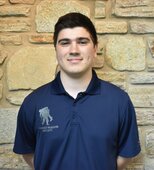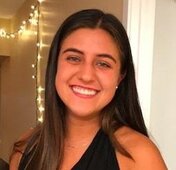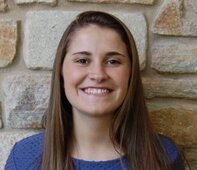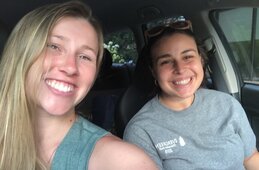Senior Projects 2020
Aaron Pin and Ian Leppo


Loyola Notre Dame Library Beacon System
Client: Matthew Treskon, Head Tech Librarian at Loyola Notre Dame LibraryThe Loyola Notre Dame Library Beacon System (LNDLBS) allows library patrons to find information about and reserve nearby rooms in the library using their smartphone. The system uses Raspberry Pis set up at certain rooms in the library, which transmit signals at routine intervals of their operation. The app receives and processes these signals to let the user reserve that room in a matter of seconds. Additional functionality of the app includes manually reserving rooms, locating beacons, and searching for rooms fulfilling certain criteria like having windows, enough chairs, or a whiteboard.
Alyssa Schilke and Josh Bennett


Baltimore Underground Science Space Redesign
For our senior project, we redesigned the Baltimore Underground Science Space’s website. Our client Dr. Lisa Scheifele is a professor in Loyola’s Biology department, and a board member of the Baltimore Underground Science Space (BUGSS). To improve the engagement of the BUGSS website, Dr. Scheifele asked us to add interactive features to showcase the community’s research, as well as fixing the old, unfinished site.
The system now features a new navigation system, design layout, and an interactive chart showcasing BUGSS’ Barcoding the Harbor project. We also updated information about how to get involved in the community. The system uses the Eventbrite API to update the page with BUGSS upcoming events. The interactive portion of the system displays a clickable chart of project data to let users dynamically explore the results. No matter what level of scientific detail the user is looking for, the BUGSS interactive project page can help the user find the relevant information.
Broc Burger and Ryan Heenan


Client: David Rivers, Biology Chair at Loyola University Maryland
Our client seeks to create a website to help students find internships in science, as most science careers look for prior internship experience. With that goal in mind, our project is to create a website catered to students in the science departments to help them search and apply for internships. This website allows for students to search for positions within their region of choice, apply, and hear back from their desired companies. By bringing this website to life, we aim to help students gain the experience they need to further prepare them for the real world after they graduate.
Caleb Renfroe and Colin Heaning


Clients: David Opitz and Donald Pollitz, Loyola Office of Technology Services
For our senior project, we were tasked with implementing a Fantasy Sports Optimal
Lineup Generator (FSOLG) for our clients. Don is an avid fantasy sports fan, and Dave
is a math geek, and together they asked for a program that could use statistics instead
of gut intuition to develop the best fantasy sports lineup for their fantasy leagues.
The program scrapes sports data from the web and uses that information to train a
machine learning model in order to predict an optimal lineup.
Chelsea Meier and Rye Verille


Loyola University Degree Planner
Client: Dr. Suzanne Keilson, Engineering Professor and Advisor
The Loyola University Degree Planner is a website built to provide students and advisors with a one stop shop for creating four-year degree plans. Dr. Keilson presented the idea for a degree planning website as she saw many flaws within the current process of creating degree plans. This current process requires the use of numerous websites and resources and therefore degree plans cannot be created with ease. The Loyola University Degree Planner website is built to bring simplicity and ease to the degree planning process. The website accommodates all students pursuing majors within the departments of Computer Science, Engineering, Mathematics, and Statistics. Ultimately, the website provides students and advisors the ability to drag and drop all of the required courses needed for a degree, major, and possible minor combination of their choosing, into labeled semester and summer sections. This layout will allow students and advisors to create degree plans in an organized and efficient way.
Javon Kitson and Dan Gerardi


Library Decibel Meter
Client: Mathew Treskon, Loyola Notre Dame Library
This project is intended for the Loyola Notre Dame Library patrons and staff. The
goals of the project are to detect the sound levels around the library, and update
a web application so that people can find the quietest place to sit. The Decibel Meter
uses Raspberry Pi's to monitor the sound levels in the rooms in the library, and updates
a database with that information, which is then displayed on the website. The Raspberry
PI's also have LED's on them to indicate to the individuals around it whether they
are being too loud.
Jen Moutenot and Mollie Morrow


POTSie Tracker
Client: Tasha Lewis, Loyola University Maryland
POTSie Tracker is a software system consisting of an Android application and two MySQL databases. The goal of POTSie Tracker is to provide customizable medical tracking for individuals with Postural Orthostatic Tachycardia Syndrome (POTS). Currently, the POTS community uses many different applications for their tracking needs, however there does not exist a single application with all of the needed functionality. The application’s main features include hydration tracking, sodium tracking, heart rate tracking, symptom tracking, and medication tracking. Users may customize these features by changing various information contained within their customized medical profile, which includes information that would appear on a medical bracelet. Users will also be able to view the tracking information recorded on previous days so that they are able to share specific information or symptoms with health care professionals. POTSie Tracker is a medical tracking application, however its main purpose in to provide the POTS community with the features and customizations that they need on a daily basis.
Patrick Sacchet

Efficient Compression of Multi-channel Biomedical Data via Neural Network and Compression
Algorithm Implementation
Research Advisor: Dr. Isaacman
Multi-electrode arrays (MEAs) currently serve as some of the most powerful devices
in detecting neurological issues and disorders in patients. Due to their ability to
collect such large amounts of data over incredibly short periods of time, challenges
arise when it comes time to store this data efficiently and accurately while also
ensuring the device operates under a certain power envelope so as to prevent any damage
to a patient's brain. In our research, we investigate if it is possible to implement
neural networks in cross-channel prediction, and in addition, if we could further
compress these predicted channels' data points via the implementation of a compression
algorithm. In delving into the possible implementations of neural networks and compression
algorithms, our work proposes possible future avenues of approach for improving upon
MEAs using brain wave data collected over 128 channels.
Rebecca Martino

Understanding Mobility Contextually
Client: Dr. Isaacman
Our research is focused on how people move and act differently based on where they
are. We are investigating how we can characterize locations based on their populations
and luminosities to represent different types of places. We have found that characterizing
locations in this way enables us to predict cell network loads, how frequently and
when cell towers are contacted, and movement patterns more accurately than with past
calling patterns alone. This research will be useful to determining how to configure
and build networks in future work.
Richie Kogut

Combinatorial Methods for Explainable AI
Clients: Dr. Raunak (Loyola University Maryland), and D. Richard Kuhn (National Institute of Standards and Technology)
Combinatorial testing methods provide an efficient and effective way to test programs with a large amount of inputs. Explainable AI classification algorithms provide the perfect medium for which to use these testing methods. The work conducted involves taking the comXAI tool, an existing combinatorial testing tool, and modifying it so that it is better suited for use with large machine learning (ML) datasets. ML datasets are large with a high number of parameters and thousands of entries within them. The previous state of the tool renders it somewhat ineffective on testing large ML datasets, so a series of improvements were identified to make the tool more useful in analyzing these datasets. The improvements include rewriting the tool using the Python programming language, examining different Python compilers, improving code inefficiencies, mapping strings to integers, and some improvements to the tool’s testing output. All of these improvements will be analyzed as a whole to determine the new limits of testing that the comXAI tool will be able to handle.
Robby Ackerman and Thomas Schlectic

JSON4JSON
JSON4JSON is a dynamic JSON editing user interface. This program allows users to generate a fillable form using a JSON schema file. The system starts with a static screen where the user can select an optional JSON data file and a mandatory JSON schema file from their file explorer. Upon selecting these files, the user can then generate the dynamic UI form and input the information required by the JSON schema file. If the user selected a preexisting data file, the form would prepopulate the UI fields with the existing data from the JSON data file. This setup allows the user to both save and update JSON files to their computer for future use.
Chiara Maalouf and Sarah Flaherty

Sleep Simple Web Application
Client: Dr. Amy Wolfson, Loyola University Maryland Psychology Department
The Sleep Simple Web Application (SSWA) is being developed to increase the efficiency of a sleep and caffeine research project being conducted by the Loyola Psychology Department. Originally, participants were asked to fill out a paper form of questions pertaining to caffeine intake and sleep habits twice a day for a 7 day period. The SSWA’s goal is to digitize this process. There will be a website for participants to fill out these forms electronically, and a website for administrators to view and edit participant information logs with ease. The SSWA also aims to provide a comprehensive database of caffeinated products for participants to choose from. This database will be much more extensive than the previous one-page list of caffeinated products. The SSWA should improve the experience of the research project for both the administrators and the participants.
Sean McDermott

NFL Athlete’s Twitter Sentiment
Client: Dr. Greg Hoplamazian; Assistant Professor, Department of Communication
My project consisted of creating an application that allows the user to enter a twitter
handle and a date range, and the tool will return up to 200 tweets from Twitter’s
API that satisfy the criteria to aid in harvesting twitter data for future research.
With this tool, I collected tweets from a variety of NFL athletes who have been subjected
to a public arrest in hopes of determining which athletes used Twitter to respond
to their arrest. Moreover, I gathered all the replies that occurred within 2 weeks
of each athlete’s arrest to determine the public sentiment regarding that athlete’s
arrest. My client and I manually determined the sentiment of a sample of replies,
and this sentiment label served as the label column for Multinomial Naïve Bayes supervised
machine learning model. I trained the model on the labeled replies, and after solid
performance, I used the model to predict the sentiment of the remaining 6,000 replies.
With defined sentiment for each reply, my client can analyze the data to determine
if a response to the arrest improved the reaction towards the athlete’s arrest.
Sebastian Quiroga

Sentiment Analysis of Library Chat Logs
Client: Matthew Treskon, Technology Librarian at Loyola Notre Dame Library
For this project I will be analyzing chat logs from the Loyola-Notre Dame Library.
My client has given me the task to take the chat logs that were recorded within the
past year and determine the usability of the chat, as well as if they are being useful
to those who use them. The data contains some unnecessary data, as well as some private
information that should be kept personal, so we must clean the data first. Once that
has been completed, we will use R and R studio to perform cluster analysis to identify
common themes. We will then use AWS Comprehend to perform sentiment analysis to identify
the sentiment within our groups, and compare the sentiment to certain topics such
as out cluster groups or the time period during when the chats took place. Finally,
we will build a predictive model so we can predict when the texts occur or which group
they belong to.
Syed Kazmi

Loyola Interfaith Relations Analysis
Client: Rev. Scott Adams (Assistant Director, Campus Ministry)
My senior project consists of doing an analysis on the IDEALS survey that was given
to students at Loyola University Maryland. This survey measured various responses
to diversity and faith related experiences on campus. The survey data will be used
in this analysis in order to come up with an effective plan to drive engagement and
participation in Interfaith events and programming on campus.
Senior Projects 2017 Senior Projects 2018 Senior Projects 2019 Senior Projects 2021